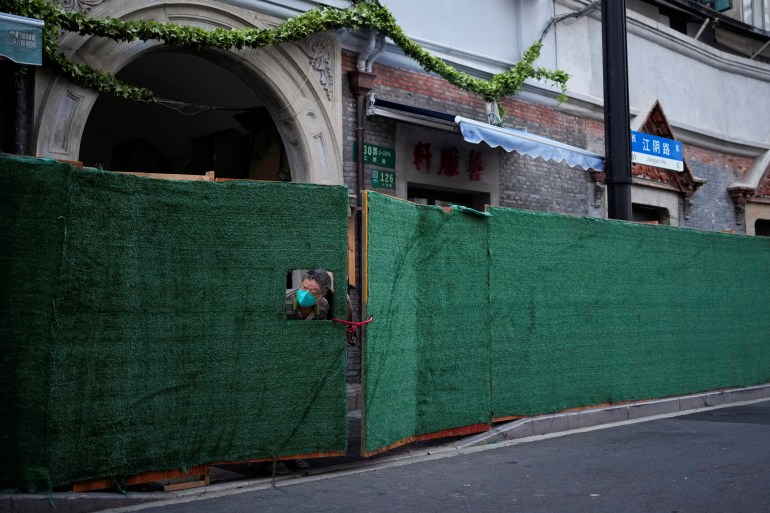Beijing, China – Ai Jing, a concert booker in Beijing, often feels like business never has a chance to pick up from the latest COVID-19 curbs before another round of restrictions brings operations grinding to a halt.
Ai, who runs the concert booking agency Haze Sounds, struggles to find musicians these days since a ban on live events in the capital introduced in April forced many of them out of the business.
Ai can hardly look to touring musicians either, as few are willing to make plans amid the constant risk of a sudden lockdown in any city where cases crop up.
Meanwhile, music buffs are wary of coming into contact with COVID-positive concertgoers and having to quarantine, putting a damper on ticket sales.
“The zero-COVID policy makes the live music business incredibly uncertain and unpredictable,” Ai told Al Jazeera.
China’s ultra-strict “dynamic zero-COVID” strategy, under which entire cities are shut down over a handful of cases, has taken an especially heavy toll on the country’s live music and entertainment establishments, which are typically among the last businesses to benefit from easing restrictions.

While sweeping restrictions that shuttered restaurants and other businesses have been lifted in major cities such as Beijing and Shanghai, countless bars, karaoke joints, nightclubs and concert venues across the country are still waiting to emerge from restrictions introduced months earlier in the year.
In Beijing’s usually bustling Chaoyang district, a cocktail bar owner who spoke on condition of anonymity said that her establishment remains closed, even though bars in sleepier districts have been permitted to reopen.
“They think bars or clubs are only for fun and should be closed,” the bar owner told Al Jazeera, adding that the authorities’ rigid stance is leading many of her fellow bar owners “to think Beijing isn’t a good place for bars in the future.”
Xin Sun, a senior lecturer in Chinese and East Asian business at King’s College London, said authorities have taken a particularly hard line on entertainment establishments due to their association with major outbreaks earlier in the pandemic.
“These crowded and enclosed venues are perceived to be more risky, which prompted the local government to suspend many of them,” Xin told Al Jazeera.
In June, bottled beer bar Heaven Supermarket became the centre of a major outbreak in Beijing.
The bar attracted unyielding scrutiny not only because of the size of the outbreak — involving 287 cases, according to state media – but also because its management “impeded the prevention of infectious diseases”.
Following the outbreak, authorities revoked the bar’s licence and launched a criminal case against the owner.

Although such superspreader events have attracted attention, single-digit infections have been enough to grind cities to a halt.
In Wugang, a city in Henan province known for producing steel, a single positive case prompted authorities to put the entire population of 300,000 in lockdown for three days starting from July 11. Partial lockdowns and business closures covering millions of people have been introduced in Xian, Lanzhou, Haikou, Macau, and Anhui province in recent weeks.
Xin of King’s College said the severity of future restrictions could depend on the city or province in which infections are detected.
“If a massive outbreak occurs, as has been the case more recently in the two counties in Anhui, I would argue local governments will be forced to impose draconian lockdowns to ensure zero COVID to be achieved and show their political loyalty to the party’s policy line,” he said.
“For major cities such as Beijing and Shanghai, if the cases are not particularly high, what we are more likely to see is local lockdowns at neighbourhood levels.”
For Marco Chao, the owner of Bubble Lab Brewing, the constantly shifting restrictions and policy uncertainty has led him and his team to brew more canned beer for sale online and at shops.
“That way we don’t have to rely on bars, which are more easily affected by lockdowns and quarantine,” Chao, whose business has locations in Wuhan, Hubei province and Changzhou, Jiangsu province, told Al Jazeera.
Bastien Ciocca, co-owner of the Hope & Sesame speakeasy bar in Guangzhou, said the nightlife sector as a whole is struggling.
Before zero COVID, “the situation was quite smooth, while the rules were kept in place,” Ciocca said. However, “when a few cases get found in a city, things tend to come to a halt for the food and beverage and particularly bar businesses,” he said.

For businesses not dependent on nightlife, the outlook is more optimistic.
Zhang Yi, CEO of iiMedia Research, said many technologically innovative businesses have been able to thrive under “zero COVID”.
“The live streaming and e-commerce industries have achieved good results in innovation,” Zhang told Al Jazeera. “Dining, tourism and aviation have been largely impacted. The effects of the restrictions on those enterprises has been undeniable. But other industries have been able to innovate. And from a long-term perspective the overall economic aggregate will rise.”
Even so, Beijing’s uncompromising pandemic strategy has “dramatically increased business uncertainties”, Xin said.
With authorities giving no indication of any change to the zero-tolerance strategy any time soon, the constant threat of future lockdowns remains.
Ai, the concert booker, is bracing for more restrictions that he expects to reverberate far beyond the nightlife sector.
“I worry about that very much,” Ai said. “If this goes on, not only my business will be affected. Eventually it will kill the live music scene, and devastate the whole culture sector.”
"Scene" - Google News
July 14, 2022 at 04:00PM
https://ift.tt/W5NyscD
For China’s nightlife scene, ‘zero COVID’ an unceasing ordeal - Al Jazeera English
"Scene" - Google News
https://ift.tt/xj7Egiy
Shoes Man Tutorial
Pos News Update
Meme Update
Korean Entertainment News
Japan News Update
No comments:
Post a Comment